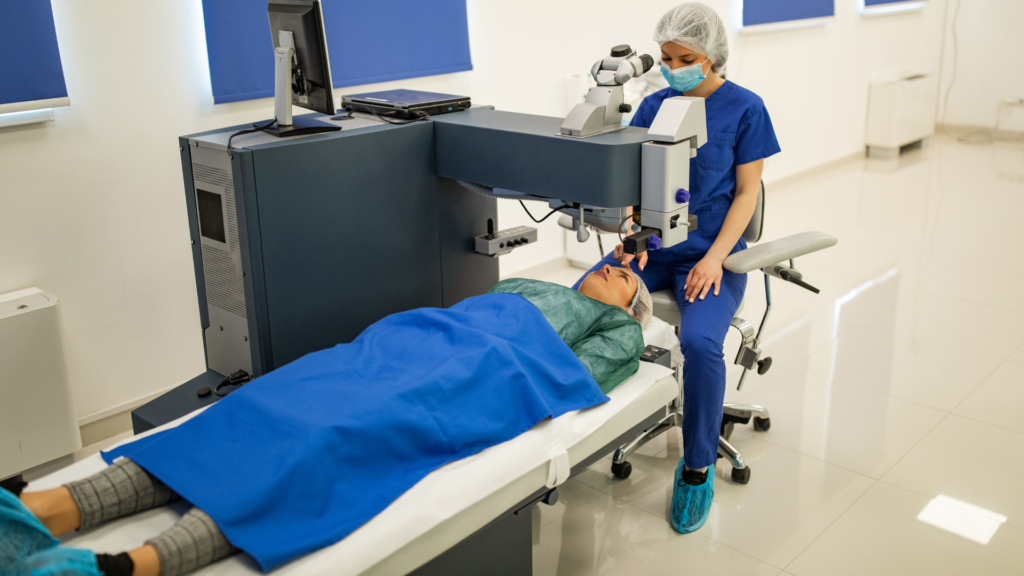If you experience issues like an ingrown eyelash or foreign particles in your eye, your attention naturally focuses on immediate relief. However, you may not often contemplate the intricate structures like the cornea, iris, or lens. Yet, when considering laser eye surgery, these components become paramount. Laser eye surgery offers a safe and effective solution for correcting various vision problems, including nearsightedness, farsightedness, cataracts, and astigmatism.
You may have heard that laser eye surgery can provide the perfect vision you desire. Whether seeking to correct distance vision or address nearsightedness or astigmatism with contacts or glasses, laser eye surgery presents a viable option. However, before proceeding, it’s imperative to consult an optometrist south san francisco (if residing there) for a thorough examination and consultation.
During your visit, your optometrist will assess your eye health, evaluate your vision prescription, and determine your candidacy for laser eye surgery. They will discuss the potential benefits and risks, address any concerns you may have, and guide you in making an informed decision about your eye care options.
In addition to consulting a doctor, here are some dos and don’ts to consider regarding laser eye surgery.
Dos:
- Follow What the surgeon instructed: When considering LASIK surgery, your focus is likely on maximizing the benefits of the procedure, including optimizing your recovery time. Following your surgeon’s instructions is key to ensuring a smoother recovery process. However, it is crucial to verify that your surgeon is both qualified and reputable, as choosing otherwise may expose you to the risk of surgical complications. In the unfortunate event of complications, it’s important to be aware of your legal rights (find more information here) and the option to pursue legal action based on medical negligence. Nonetheless, a more prudent approach is to safeguard yourself from the start by selecting the services of a trustworthy professional. This proactive step can significantly reduce the likelihood of complications and contribute to a positive LASIK experience.
- Take the prescribed medication: As the patient, you’re responsible for taking your eye drops as prescribed and using them as directed. If you weren’t aware, the LASIK eye surgery procedure isn’t a one-time, easy fix, but instead, a complex surgery that requires ongoing care.
- Blink: After surgery, your eyes may feel dry; thus, it is important that you blink more frequently than normal in order to keep them hydrated. This will enable them to maintain their health and heal more quickly.
- Clean your face: During the course of the day, dirt and other contaminants from the surrounding environment may accumulate on your face. Keeping your face clean on a regular basis, without touching your eyes or getting water in them, is the best thing you can do to protect your eyes and keep them healthy.
- Avoid strenuous activities: After laser eye surgery, daily activities like working and exercising often become difficult. After surgery, your eyes may be dry and irritated, and it may not feel as comfortable to read, watch TV, or drive. This can make recovery slow, but it’s important to avoid strenuous activities while you recover.
- Wearing Protective Eyewear: If you have undergone laser eye surgery, you are probably experiencing some discomfort, hopefully, minimal discomfort, and most likely some redness, swelling, and dryness. Despite what you might think, however, you should not be wearing regular glasses or contact lenses when outdoors after LASIK or other laser eye surgery. Protect your vision by wearing appropriate polarized sunglasses at all times when outdoors, even if you do not consider it to be sunny.
- Take some time off: Any time you have any type of surgery, it’s important to take the necessary time off to rest and recover.
- Check your Health Insurance: Usually, laser eye surgery isn’t covered by your health insurance. In the case of Medicare, for instance, there are some exceptions to this policy. If you happen to have an underlying medical condition like cataracts or glaucoma, then Medicare would cover the surgery as part of the treatment for the underlying medical condition. Regardless, it will be better if you check with a medicare consulting service before you make an informed decision.
Don’ts:
- Avoid a low grade surgical facility: Choosing a low-grade facility for laser eye surgery can lead to serious consequences. While the lower cost may seem appealing, these facilities often lack the expertise and safety standards needed for successful procedures. They may have poorly trained staff and outdated equipment, raising your risk of complications and infections. In cases of negligence or malpractice, you could even experience vision impairment or permanent damage to your eyesight. This could further lead to the need for immediate legal action, with the assistance of a lawyer from firms like Schuerger Shunnarah Trial Attorneys, to protect your rights and possibly file a lawsuit against the facility.
- Avoid driving for 24 hours: After laser eye surgery, whether you wear glasses or contact lenses, you’ll want to avoid driving until your eyes have completely healed. Since your eyes are still sensitive and you may be experiencing some blurred vision, you won’t be able to drive safely. Although you can resume driving once your vision has improved, you should wait at least 24 hours after surgery before doing so.
- Avoid touching or rubbing the eyes: Laser eye surgery is an increasingly popular procedure, but it comes with some risks. While complications are rare, the most common risks include infection, corneal abrasions, dry eye syndrome, and retinal detachment. Patients should comply with post-operative instructions to reduce the risk of these complications. One such instruction is to avoid touching or rubbing the eyes since this can result in infection.
- Do not take a shower or wash your hair until the day after: Getting laser eye surgery can have a profound impact on your life, but like any surgery, it’s important to read through all the instructions before the procedure. One tip that should be mentioned is that you should wait at least 24 hours after laser eye surgery before showering or washing your hair. Why? Because warm water and soap are abrasive and can cause inflammation, which could mean you experience blurry vision for a few days.

